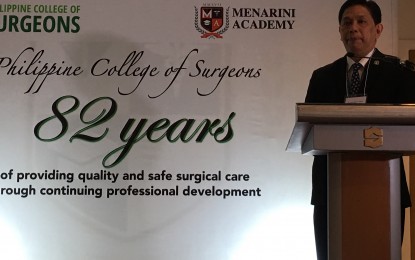
DOCTOR-PATIENT PARTNERSHIP. Philippine College of Surgeons president Alejandro Dizon says physicians are responsible for educating patients about the latest surgical and pain management options available in the field during a press briefing in Mandaluyong City on Tuesday (Dec. 4, 2018). He says both the patient and the physician must agree on how ailments should be treated. (Photo by Ma. Teresa Montemayor)
MANILA -- If physicians were to be given prescriptions as to their profession, it would be a maintenance dose of lifelong learning to serve their patients better.
Philippine College of Surgeons (PCS) President Alejandro Dizon says a true physician must commit to continuing education for the rest of their lives.
"We at PCS aim to be the leading organization of surgical professionals that is responsive to the community, committed to excellence and ethical practice. So, we want to provide continuing professional development opportunities to surgeons, promote their welfare, and represent their interests," Dizon said in a press briefing in Mandaluyong City on Tuesday.
In line with this, PCS launched on Monday its 74th Annual Clinical Congress, which aims to give physicians updates on cutting-edge surgical practices and pain management for surgery patients.
PCS has 12 branches with around 2,800 fellows nationwide.
Dizon explained that it is the responsibility of every physician to be knowledgeable of the developments in the world of medicine.
"What's new before could be obsolete the following year. There are new skills and knowledge to be learned. Physicians need to learn continually even after formal medical school and training, so they can provide the highest standard of care," he said.
While the patients have the final decision on the surgery or treatment they would undergo, Dizon stressed physicians must show all the possible and new options available to their patients.
Dizon added responsible physicians or surgeons also partner with the government in its health care agenda and provide help in terms of education and creation of health-related policies and provisions.
"If the Department of Health has advocacies, like cancer care which involves surgery as the first line of treatment, we expect, and we want to be a part of this. One major area of interest of surgeons is trauma. Whether it is a vehicular accident or other ways you're injured, it's actually the surgeons who are on top of managing this," he said.
PCS Vice President George Lim, who was also in the press briefing, explained that physicians are categorized as generalists and specialists. He said specialists spend more time studying and perfecting their skills compared with generalists.
"After four, five years of med school, there's an internship program, then licensure exam. Then if they want to be specialist surgeons, they will go through a residency program for five to seven years of intensive training. Then there's a board exam for their specialty for another year, then diplomate, and one to two years of professional practice to be a fellow. What I'm saying is you can trust our safe and competent fellows, surgeons," he said.
Citing the fact that some health problems cannot be treated by medicines alone, Dizon encouraged the public to consult physicians, specifically surgeons, and request for options that could treat them and extend their lifespan.
"Gone are the days when the patient entrusts everything to the doctor. In fact, I don't encourage the "Bahala ka na, Doc" mentality, because it is important to include the patients in the health care plans," he said.
Meanwhile, Lim said quality surgery is available for all and there is a rapid development of techniques and technologies in the pain management field.
"There's minimally invasive surgery performed through tiny incisions, also known as keyhole surgery. The smaller the incision, the less pain you feel, as well as scar and fewer hospitalization days," he added. (PNA)
